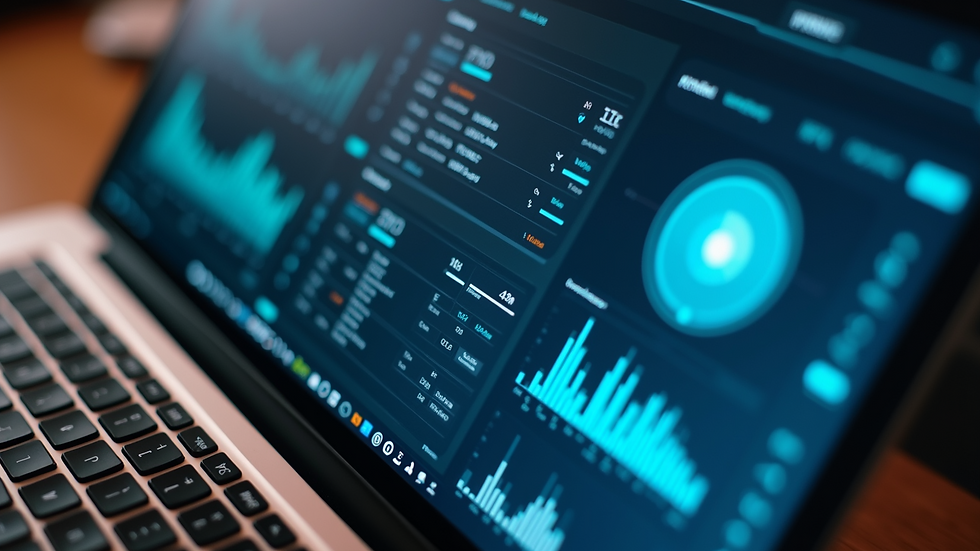Unveiling the Impact of AI on Cybersecurity Strategies for Startups: A New Era of Protection
- CyberShield NXT

- Oct 9, 2025
- 4 min read
In today's fast-paced world, startups are at the forefront of innovation, but this growth comes with new challenges, especially in cybersecurity. Cyber threats are becoming more sophisticated as technology evolves, and protecting sensitive information is crucial for any business.
Thankfully, Artificial Intelligence (AI) has emerged as a powerful tool, reshaping how startups defend against cyber risks. This blog post explores the transformative role of AI in enhancing cybersecurity strategies among startups, discussing its benefits, challenges, and future trends.

Understanding the Cybersecurity Landscape for Startups
As startups navigate the digital realm, they face a unique set of cybersecurity challenges. With nearly 43% of cyberattacks targeting small businesses, the urgency for startups to implement effective cybersecurity measures has never been clearer. Many startups operate with limited budgets and resources, making them attractive targets for cybercriminals who exploit poor security practices.
AI can bridge the security gaps left by traditional methods, providing automation that enhances threat detection and insights for better decision-making. For example, startups can deploy AI tools to analyze network activity, flagging potential threats before they escalate into serious incidents.
This shift towards AI-driven cybersecurity is not just an option but a necessity for startups wanting to thrive in a digital-first world.
The Role of AI in Enhancing Threat Detection
AI significantly improves threat detection capabilities by moving beyond basic signature-based detection systems. These traditional methods often fail to capture sophisticated threats.
AI algorithms can process and analyze massive datasets in real time, spotting anomalies that signal potential breaches. For example, a startup utilizing machine learning may identify a 75% increase in login attempts from a specific location, raising a red flag that prompts further investigation.
Moreover, AI-driven platforms can synthesize information from several sources, providing actionable insights that help startups fortify their cybersecurity defenses. Instead of waiting for issues to arise, startups can proactively address vulnerabilities, thus enhancing their overall security posture.
Automating Incident Response
When a security incident occurs, quick response times are vital. Many startups struggle to maintain a dedicated security operations center (SOC), making it difficult to react promptly to threats.
AI helps by automating incident response protocols. When a problem is detected, AI can swiftly isolate affected devices, block malicious IP addresses, and even restore systems to a secure state—all without human input. For instance, a small startup experienced a breach where AI systems kicked in, isolating compromised endpoints in under 5 minutes, significantly reducing potential damage.
This level of automation not only mitigates immediate threats but also allows startups to focus on growth, knowing their cybersecurity is in capable hands.
Strengthening User Authentication
Strong user authentication is vital in a cybersecurity strategy, and AI enhances this process significantly. Traditional password systems can be easily compromised, but AI allows for more secure authentication using advanced techniques.
For example, biometrics like facial recognition or fingerprint scanning can be integrated with AI to create robust authentication processes. A study showed that 70% of businesses using multi-factor authentication saw a decrease in unauthorized access attempts. Additionally, AI systems continuously learn from user behavior, enabling adaptive authentication that prompts users for extra verification when unusual activity is detected.
This streamlined approach enhances security while maintaining a user-friendly experience, ultimately encouraging safer practices.
Predictive Analytics for Proactive Defense
AI also brings predictive analytics into the cybersecurity mix, helping startups take a proactive stance against potential threats. By examining historical data, AI can forecast future attacks, allowing startups to bolster defenses before incidents occur.
For instance, AI can flag vulnerabilities in a startup's software, alerting them to fix weaknesses before they are exploited. Predictive models can even prioritize these vulnerabilities, allowing startups to allocate resources effectively—reducing risk by up to 60% in some cases.
Embracing this proactive approach not only strengthens security measures but also boosts customer confidence, showcasing a commitment to data protection.
Challenges of Implementing AI in Cybersecurity
Despite the numerous benefits of integrating AI into cybersecurity strategies, startups may encounter obstacles:
1. Cost and Complexity:
AI solutions can be expensive, and many startups have limited budgets. Investing in advanced systems may seem out of reach for some startups.
2. Skill Gap:
There is a global shortage of professionals skilled in both cybersecurity and AI. This talent gap can make it difficult for startups to find qualified personnel to manage these sophisticated systems.
3. Data Privacy Concerns:
AI typically requires large sets of data to perform effectively. Startups must navigate data privacy laws and ensure compliance while leveraging AI capabilities.
Addressing these challenges thoughtfully can lead to substantial rewards. Collaborating with third-party service providers or training existing staff can help overcome barriers.
Future Trends of AI in Cybersecurity
Looking ahead, the role of AI in cybersecurity will continue to expand. Here are a few trends that startups should watch for:
1. Increased Adoption of AI-Driven Threat Hunting:
More startups will adopt AI platforms that actively identify and counter threats, shifting from reactive to proactive security measures.
2. Integration of AI with Cybersecurity Mesh Architecture:
Cybersecurity mesh allows businesses to seamlessly secure distributed networks. AI will play a critical role in creating unified security solutions across various platforms, enhancing visibility.
3. Cybersecurity-as-a-Service (CaaS):
Due to resource limitations, many startups will seek CaaS providers equipped with AI capabilities. This model offers access to advanced cybersecurity support without requiring extensive in-house infrastructure.
By staying informed and adapting their strategies according to these emerging trends, startups can maintain robust defenses against evolving cyber threats.
Embracing the AI Revolution in Cybersecurity
The integration of AI into cybersecurity strategies for startups marks a significant turning point. As cyber threats continue to evolve, embracing AI technology is essential for safeguarding assets and building trust with clients.
With improvements in threat detection, automation of responses, and proactive defense mechanisms, AI equips startups to tackle the complexities of modern cybersecurity landscapes effectively.
While challenges are present, the potential benefits surely outweigh them. As startups invest in AI-driven cybersecurity solutions, they are not just making a strategic decision but are prioritizing their survival and growth in an increasingly digital world.
By leveraging AI, startups can protect themselves from cyber threats and foster innovation, paving the way for a more secure future.









Comments